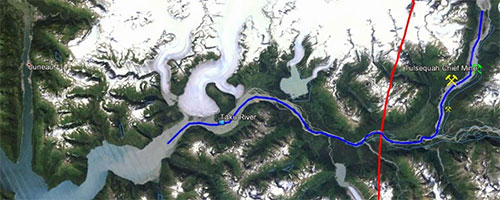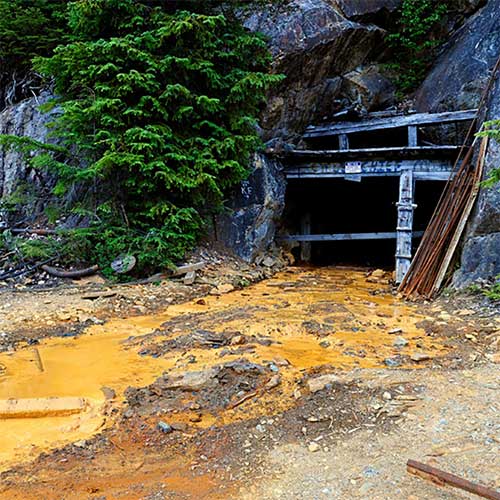Taku River and the location of the Tulsequah Chief Mine |
“Indigenous people have stewarded the lands and rivers of this region since time immemorial. The rivers we share with Canada connect our history, our traditions, our family, and our way of life,” President Peterson said. “We don’t want toxic mine tailings and dams upstream from our communities. Canada’s mining in our shared rivers is one of the biggest threats to our wild salmon and our Indigenous way of life.”
Under Secretary of Interior Deb Haaland’s and President Joe Biden’s leadership, DOI has made significant strides in tribal relations, and supporting Indigenous stewardship of traditional lands in Southeast Alaska’s Tongass National Forest.
The U.S. Department of Agriculture, which manages much of the land in Southeast Alaska through the U.S. Forest Service, has also worked with Tlingit & Haida to develop the Southeast Alaska Sustainability Strategy (SASS) to help support a diverse economy, enhance community resilience and conserve natural resources.
Across the border from Southeast Alaska, however, is a threat shared by multiple tribal nations in four U.S. states, the contamination of international and tribal rivers from poorly regulated gold and coal mining just over the political border, in British Columbia, where more than 30 large-scale gold and copper mines are in advanced stages of exploration, development, and operation or already abandoned and contaminating the headwaters of the region’s largest salmon-producers, the Taku (T'aaku?), Stikine (Shtax'héen) and Unuk (Joonáx?) Rivers.
Picture showing acid mine drainage for decades from the Tulsequah Chief Mine flowing into the Tulsequah River which is a tributary of the Taku (T'aaku) River. |
On Friday, December 9, 2022, Tlingit & Haida's Executive Council unanimously adopted a resolution ( EC 22-68 ) urging the U.S. government to "pause permitting, exploration, development, and expansion of British Columbia mines on the Canadian side of the border along shared Alaska-British Columbia salmon rivers until a binding international agreement on watershed protections, developed by the federal, tribal and First Nations governments in these shared transboundary watersheds and consistent with the Boundary Waters Treaty of 1909, is implemented."
The resolution also calls for the U.S. government to meet with local communities and Indigenous leaders when working on an international agreement to ensure mining companies are held responsible for waste cleanup and that communities are compensated for any environmental damage caused by mining activities.
Tlingit & Haida is the largest tribe in the State of Alaska, representing more than 35,000 tribal citizens. The lands and waters of coastal Southeast Alaska are of significant and unique cultural, ecological, subsistence, economic, and recreational value; they connect icefields to oceans and are home to brown bears, black tail deer, wolves, five species of Pacific salmon, and countless other foods and culturally significant resources. These lands and waters provide incredible opportunities for large-scale, collaborative projects with Aboriginal First Nations in British Columbia that can connect and restore the lands, waters, and wildlife that are the foundation of our cultural existence and economic welfare – the conservation and restoration of our traditional lands and waters is crucial to maintaining our way of life and is an expression of our sovereignty.
“As sovereign nations, tribes in Southeast Alaska have an inherent right to protect and manage our watersheds,” President Peterson said. “In the face of a rapidly changing climate, British Columbia continues to permit massive open-pit gold mines in the headwaters of our largest salmon producing rivers without the consent of downstream communities. Our way of life depends upon the health of our transboundary waters and we will not stop until we can ensure the environmental security and stability of our rivers and communities.”
Tlingit & Haida's Natural Resource Manager, Jill Weitz, also participated in meetings with Indigenous leaders and representatives from Alaska, Washington, Montana, and British Columbia as they met with members of Congress and the federal administration in Washington, D.C.
Related News:
After 65 years of waiting, an acid wast-generating abandoned mine in the Taku River watershed may finally be cleaned up. Posted & Edited By MARY KAUFFMAN
SITNEWS - September 03, 2022
Edited By: Mary Kauffman, SitNews
Source of News:
Central Council of the Tlingit and Haida Indian Tribes of Alaska (Tlingit & Haida)
www. cthita-nsn.gov
Representations of fact and opinions in comments posted are solely those of the individual posters and do not represent the opinions of Sitnews.
Send a letter to the editor@sitnews.us
SitNews ©2022
Stories In The News
Ketchikan, Alaska
Articles & photographs that appear in SitNews are considered protected by copyright and may not be reprinted without written permission from and payment of any required fees to the proper freelance writers and subscription services.
E-mail your news & photos to editor@sitnews.us
Photographers choosing to submit photographs for publication to SitNews are in doing so granting their permission for publication and for archiving. SitNews does not sell photographs. All requests for purchasing a photograph will be emailed to the photographer.


